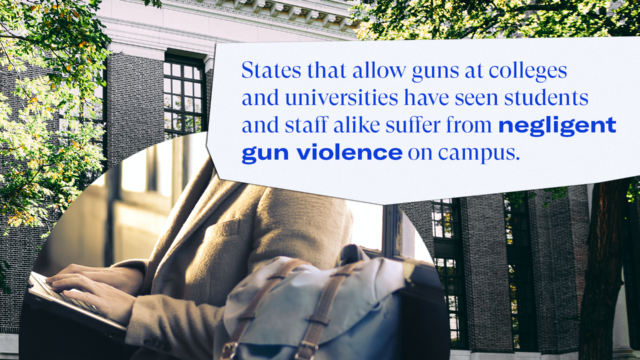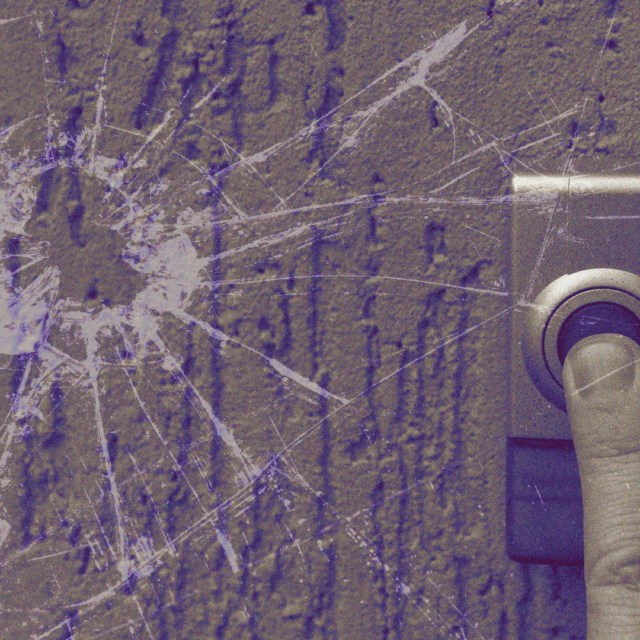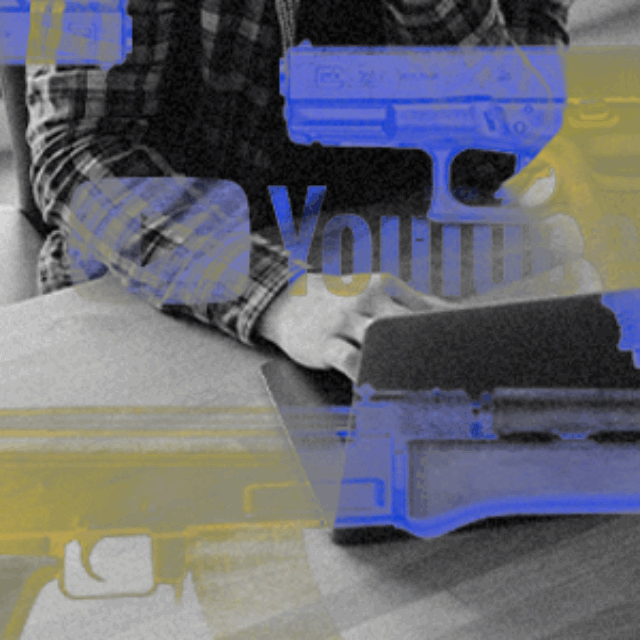The Danger of Guns on Campus

Introduction
James Madison, the author of the Second Amendment, and Thomas Jefferson, the author of the Declaration of Independence, believed guns had no place on college campuses. In 1824, at a University of Virginia Board of Visitors meeting, both Madison and Jefferson supported a rule prohibiting firearm possession and use by students at the university.1Olivia Li and The Trace, “When Jefferson and Madison Banned Guns on Campus,” The Atlantic, May 6, 2016, https://bit.ly/2VvHL8E.
Over the last decade, the gun lobby and its allies have introduced legislation that would force colleges and universities to allow guns on campus. This legislation, which would create new dangers for students and staff and burden schools with significant financial costs, is widely opposed by university stakeholders from students to college presidents to police chiefs. Statehouses should not override the judgment of our colleges and universities, especially given the already unprecedented challenges they are facing during the pandemic risk factors common to campus life.
Research shows that policies that force colleges to allow guns on campuses are likely to lead to more shootings, homicides, and suicides, and that they’re unlikely to prevent mass shootings on campus.2Daniel W. Webster et al., “Firearms on College Campuses: Research Evidence and Policy Implications,” Johns Hopkins Bloomberg School of Public Health, October 15, 2016, https://bit.ly/2WmmWNm. Despite this, the National Rifle Association (NRA) began its push to force colleges and universities to allow guns on campus following multiple high-profile campus shootings. In 2008, after the 2007 mass shooting at Virginia Tech that killed 32 people, and another in 2008 at Northern Illinois University that killed five people, the NRA proposed, and the American Legislative Exchange Council (ALEC) adopted, a model bill that would force colleges to allow guns on campus.3National Rifle Association Institute for Legislative Action, “ALEC Task Force Adopts Model ‘Campus Personal Protection Act,’” May 23, 2008, https://bit.ly/33LTh4i. The push has accelerated ever since, with bills to force colleges to allow guns introduced in 37 states since 2015.4AK, AL, AR, AZ, CA, CO, FL, GA, IA, IL, IN, KS, KY, LA, ME, MI, MN, MO, MS, MT, NC, ND, NH, NM, NV, OH, OK, OR, SC, SD, TN, TX, VA, WA, WI, WV, WY.
The gun lobby claims that guns on campus is a Second Amendment issue, but the Supreme Court of the United States disagrees. Writing for the majority in District of Columbia v. Heller, Justice Scalia wrote that the Second Amendment does not cast doubt on the validity of “laws forbidding the carrying of firearms in sensitive places such as schools…”
District of Columbia v. Heller, 554 U.S. 570, 627 (2008).
The vast majority of states either prohibit guns on campus or allow colleges to decide for themselves. Only a few states force colleges to allow all concealed carry permit holders to carry guns everywhere on campus. Some other states force colleges to allow guns on campus in some circumstances.
Which states don’t force colleges and universities to allow concealed guns on campus?
36 states have adopted this policy
No Guns Mandate on College Campuses
Alabama has adopted this policy
No Guns Mandate on College Campuses
Alaska has adopted this policy
No Guns Mandate on College Campuses
Arizona has adopted this policy
No Guns Mandate on College Campuses
Arkansas has not adopted this policy
- If not, where and to whom does the mandate apply?
- Permit holders with enhanced certification must be allowed to carry on public campuses.
No Guns Mandate on College Campuses
California has adopted this policy
No Guns Mandate on College Campuses
Colorado has adopted this policy
No Guns Mandate on College Campuses
Connecticut has adopted this policy
No Guns Mandate on College Campuses
Delaware has adopted this policy
No Guns Mandate on College Campuses
Florida has adopted this policy
No Guns Mandate on College Campuses
Georgia has not adopted this policy
- If not, where and to whom does the mandate apply?
- Permit holders must be allowed to carry on public campuses.
No Guns Mandate on College Campuses
Hawaii has adopted this policy
No Guns Mandate on College Campuses
Idaho has not adopted this policy
- If not, where and to whom does the mandate apply?
- Enhanced carry permit holders must be allowed to carry in certain buildings and on campuses of public colleges.
No Guns Mandate on College Campuses
Illinois has adopted this policy
No Guns Mandate on College Campuses
Indiana has adopted this policy
No Guns Mandate on College Campuses
Iowa has adopted this policy
No Guns Mandate on College Campuses
Kansas has not adopted this policy
- If not, where and to whom does the mandate apply?
- Anyone 21+ must be allowed to carry on public campuses, so long as there are not adequate security measures. No permit is required. Limited restrictions on who may carry.
No Guns Mandate on College Campuses
Kentucky has adopted this policy
No Guns Mandate on College Campuses
Louisiana has adopted this policy
No Guns Mandate on College Campuses
Maine has adopted this policy
No Guns Mandate on College Campuses
Maryland has adopted this policy
No Guns Mandate on College Campuses
Massachusetts has adopted this policy
No Guns Mandate on College Campuses
Michigan has adopted this policy
No Guns Mandate on College Campuses
Minnesota has not adopted this policy
- If not, where and to whom does the mandate apply?
- Permit holders must be allowed to carry on public campuses
No Guns Mandate on College Campuses
Mississippi has not adopted this policy
- If not, where and to whom does the mandate apply?
- Enhanced carry permit holders must be allowed to carry on public campuses. Students and employees are not included in the mandate.
No Guns Mandate on College Campuses
Missouri has adopted this policy
No Guns Mandate on College Campuses
Montana has not adopted this policy
- If not, where and to whom does the mandate apply?
- Permit holders must be allowed to carry on public campuses. No permit is required; limited restrictions on who may carry.
No Guns Mandate on College Campuses
Nebraska has adopted this policy
No Guns Mandate on College Campuses
Nevada has adopted this policy
No Guns Mandate on College Campuses
New Hampshire has adopted this policy
No Guns Mandate on College Campuses
New Jersey has adopted this policy
No Guns Mandate on College Campuses
New Mexico has adopted this policy
No Guns Mandate on College Campuses
New York has adopted this policy
No Guns Mandate on College Campuses
North Carolina has adopted this policy
No Guns Mandate on College Campuses
North Dakota has adopted this policy
No Guns Mandate on College Campuses
Ohio has adopted this policy
No Guns Mandate on College Campuses
Oklahoma has adopted this policy
No Guns Mandate on College Campuses
Oregon has adopted this policy
No Guns Mandate on College Campuses
Pennsylvania has adopted this policy
No Guns Mandate on College Campuses
Rhode Island has adopted this policy
No Guns Mandate on College Campuses
South Carolina has adopted this policy
No Guns Mandate on College Campuses
South Dakota has not adopted this policy
- If not, where and to whom does the mandate apply?
- Enhanced permitholders must be allowed to carry on public campuses.
No Guns Mandate on College Campuses
Tennessee has not adopted this policy
- If not, where and to whom does the mandate apply?
- Full-time employees with permits must be allowed to carry on public campuses.
No Guns Mandate on College Campuses
Texas has not adopted this policy
- If not, where and to whom does the mandate apply?
- Permit holders must be allowed to carry on public campuses.
No Guns Mandate on College Campuses
Utah has not adopted this policy
- If not, where and to whom does the mandate apply?
- Permit holders must be allowed to carry on public campuses.
No Guns Mandate on College Campuses
Vermont has adopted this policy
No Guns Mandate on College Campuses
Virginia has adopted this policy
No Guns Mandate on College Campuses
Washington has adopted this policy
No Guns Mandate on College Campuses
West Virginia has not adopted this policy
- If not, where and to whom does the mandate apply?
- Permit holders must be allowed to carry on public campuses.
No Guns Mandate on College Campuses
Wisconsin has not adopted this policy
- If not, where and to whom does the mandate apply?
- Permit holders must be allowed to carry on public campuses
No Guns Mandate on College Campuses
Wyoming has not adopted this policy
- If not, where and to whom does the mandate apply?
- Permit holders must be allowed to carry on public campuses
In the small number of states that have forced guns on to college campuses, there is no evidence that it has helped prevent mass shootings. Nor is there any reason to expect this policy to stop in-progress shootings: Under extreme duress, an armed college student or university professor cannot be expected to transform into a specially trained tactical police officer. Even some of the most highly trained members of law enforcement see their shooting accuracy significantly decrease when engaged in gunfights.5Bernard D. Rostker et al., Evaluation of the New York City Police Department Firearm Training and Firearm-Discharge Review Process (Santa Monica: RAND Corporation, 2008), https://bit.ly/2U9bk0t.
The Risk of Gun Violence on Campus Increases
Allowing guns on campus would not prevent mass shootings and would actually increase the risk of gun violence. Research indicates that this policy would likely lead to more gun homicides and suicides, more nonfatal shootings, and more threats with a firearm on college campuses.6Daniel W. Webster et al., “Firearms on College Campuses.”
In fact, colleges and universities, which have traditionally prohibited guns on campus, are already relatively safe from gun violence. Among all violent crime against college students from 1995 through 2002, 93 percent of incidents took place off campus.7Katrina Baum and Patsy Klaus, “Violent Victimization of College Students, 1995-2002,” US Department of Justice, Bureau of Justice Statistics, January 2005, https://bit.ly/3orQ4iA. According to Everytown for Gun Safety’s tracking of incidents of gunfire on school grounds, an average of 10 gun homicides occur on college campuses each year, while almost 20 million students attend colleges or universities.8Analysis of Everytown for Gun Safety’s Gunfire on School Grounds in the United States database, total gun homicide victims, excluding the shooter, on the grounds of colleges or universities between 2015 and 2019. For more information visit https://everytownresearch.org/gunfire-in-school/; US Department of Education, National Center for Education Statistics, “Digest of Education Statistics, 2019, Table 105.30: Enrollment in Elementary, Secondary, and Degree-Granting Postsecondary Institutions, by Level and Control of Institution: Selected Years, 1869-70 through Fall 2029,” December 2019, https://bit.ly/2LH5GR9.
However, campus life is rife with other risk factors that make the presence of guns potentially dangerous. In a 2019 national survey, 62 percent of US college students reported drinking alcohol in the past month, 35 percent reported getting drunk, and 30 percent reported using illicit drugs.9John E. Schulenberg et al., Monitoring the Future: National Survey Results on Drug Use, 1975-2019: Volume II, College Students & Adults Ages 19-60 (Ann Arbor: Institute for Social Research, The University of Michigan, 2020), https://bit.ly/3gSnLXV. Students who carried guns on campus were also more likely to report drinking heavily and more frequently, drinking and driving, and vandalizing property.10Matthew Miller, David Hemenway, and Henry Wechsler, “Guns and Gun Threats at College,” Journal of American College Health 51, no. 2 (2002): 57–65, https://doi.org/10.1080/07448480209596331. Alcohol use is associated with increased aggression, impaired judgment about whether to shoot a gun, and worsened aim when firing.11Brad J. Bushman, “Effects of Alcohol on Human Aggression,” in Recent Developments in Alcoholism, eds. Marc Galanter et al. (Boston: Springer, 1997), 227–43, https://doi.org/10.1007/0-306-47141-8_13; Dominic J. Parrott and Christopher I. Eckhardt, “Effects of Alcohol on Human Aggression,” Current Opinion in Psychology 19 (February 2018): 1–5, https://doi.org/10.1016/j.copsyc.2017.03.023; Brendon G. Carr et al., “A Randomised Controlled Feasibility Trial of Alcohol Consumption and the Ability to Appropriately Use a Firearm,” Injury Prevention 15, no. 6 (December 1, 2009): 409–12, https://doi.org/10.1136/ip.2008.020768.
Mental illness is a significant problem among college students. In another 2019 national survey, three out of five college students reported “overwhelming anxiety” in the past year, and two out of five “felt so depressed that it was difficult to function.”12American College Health Association, “National College Health Assessment II: Reference Group Executive Summary, Spring 2019” (Silver Spring, MD: American College Health Association, 2019), https://www.acha.org/wp-content/uploads/2024/07/NCHA-II_SPRING_2019_US_REFERENCE_GROUP_EXECUTIVE_SUMMARY.pdf. Rates of suicidal ideation also doubled between the 2006-2007 and 2016-2017 school years.13Sarah Ketchen Lipson, Emily G. Lattie, and Daniel Eisenberg, “Increased Rates of Mental Health Service Utilization by US College Students: 10-Year Population-Level Trends (2007–2017),” Psychiatric Services 70, no. 1 (November 2018): 60–63, https://doi.org/10.1176/appi.ps.201800332. With access to firearms tripling the risk of dying by suicide, the danger of allowing more guns on campus is clear.14Andrew Anglemyer, Tara Horvath, and George Rutherford, “The Accessibility of Firearms and Risk for Suicide and Homicide Victimization among Household Members: A Systematic Review and Meta-Analysis,” Annals of Internal Medicine 160, no. 2 (January 2014): 101–10, https://doi.org/10.7326/M13-1301.
States that allow guns at colleges and universities have seen students and staff alike suffer from negligent gun violence on campus. For example, in Idaho, just a few months after the passage of a 2014 law that forced Idaho colleges to allow individuals to carry guns on campus, a professor with a permit unintentionally shot himself in the leg during a chemistry lab.15Associated Press, “Idaho State University Teacher Accidentally Shoots Self in Class,” CBS News, September 4, 2014, http://every.tw/188lNOu. In 2016, a permit-holding student in Texas unintentionally discharged his gun in his dorm room just weeks after a guns-on-campus law went into effect.16Claire Cardona, “Tarleton State Student Accidentally Fires Gun in Campus Dorm,” Dallas Morning News, September 15, 2016, https://bit.ly/3mGzISB. In 2017, a Utah student with a concealed carry permit reached into his backpack and unintentionally fired his gun in a campus cafeteria, hitting a table and light fixture. It was the second incident of unintentional gunfire on the campus in two years.17Luke Ramseth, “UVU Student Accidentally Discharges Firearm near Campus Restaurants; No One Injured,” Salt Lake Tribune, April 26, 2017, http://bit.ly/2qj103T. In 2019, a Georgia student unintentionally shot and wounded himself in a campus lounge.18Gabriela Miranda, “UGA Community Debates Gun Law after Accidental Shooting on Campus,” The Red & Black, October 24, 2019, https://bit.ly/37pkknc.
See all gunfire on school grounds incidents in your state
Everytown for Gun Safety started tracking incidents of gunfire on school grounds in 2013 to gain a better understanding of how often children and teens are affected by gun violence at their schools and colleges.
Guns on Campus Lead to New Liabilities
States that have passed legislation forcing colleges to allow guns on campus are struggling to deal with the consequences. In Texas, where a guns-on-campus bill passed in 2015,19Texas SB 11 (2015). implementation has been extremely contentious. Prominent faculty members have left to take jobs in other states, and educators have withdrawn from consideration for jobs at Texas universities.20Molly Hennessy-Fiske, “New Law Allowing Concealed Guns on Campus Roils University of Texas,” Los Angeles Times, March 24, 2016, https://lat.ms/2Ih12YJ. Professors in both Texas and Georgia have brought lawsuits over guns-on-campus laws,21Matthew Watkins, “Three UT Professors Sue to Block Campus Carry,” Texas Tribune, July 6, 2016, https://bit.ly/36MJBsy; Eric Stirgus, “Professors Ask Court to Overturn Georgia’s Campus Carry Law,” Atlanta Journal-Constitution, September 28, 2017, https://bit.ly/2We1Ocr. and although the suits were ultimately dismissed, they demonstrate the discontent faculty members feel when they are forced to teach on campuses that allow guns.
In addition to potential lawsuits and loss of faculty, guns on campus would burden colleges and state budgets with hefty costs. These laws result in new expenses to ensure campus safety, including additional police and security staff, metal detectors, cameras, and protective gear. In order to comply with a Kansas law that forces colleges to allow guns on campus and implement costly security measures at each building where guns are prohibited, three universities estimated that it would cost more than $2 million to secure their athletic facilities.22Maura Ewing, “New Campus Gun Laws Have Colleges Shopping for Metal Detectors. For Big Schools, the Bills Are Eye-Popping.,” The Trace, April 25, 2017, https://bit.ly/36KYA6f. When public universities in Florida evaluated the costs of guns on campus, one university estimated spending at least $1.1 million in the first year,23Scott Travis and Gabrielle Russon, “Campus-Carry Bills Come with Hefty Price Tag, Schools Say,” South Florida Sun-Sentinel, January 15, 2016, https://bit.ly/349ZgjR. and the state’s community colleges estimated they would need at least $74 million to prepare for the policy.24Kristen M. Clark, “Florida State Colleges to Ask Legislature for $74M to Enhance Campus Security,” Tampa Bay Times, December 17, 2015, https://bit.ly/2WhGIKf. In 2014, after Idaho passed legislation that forced colleges to allow people to carry guns on campus, five state schools had to request more than $3.7 million from the state to increase security in the first year alone.25“Concealed Carry Law Costs Idaho Colleges $3.7M,” Campus Safety Magazine, February 5, 2015, https://bit.ly/3orOME9. And in West Virginia, a 2019 guns-on-campus bill proposed in 2019 was estimated to cost more than $11 million dollars to implement.26West Virginia Legislature, HB2519 Fiscal Note, February 7, 2019 https://bit.ly/3mAiLJB.
Key Stakeholders Oppose Guns on Campus
Among students, there is widespread opposition to guns on campus. According to a wide swath of surveys conducted as recently as 2018, the majority of students across multiple college campuses oppose allowing guns on campus,27Matthew R. Hassett, Bitna Kim, and Chunghyeon Seo, “Attitudes toward Concealed Carry of Firearms on Campus: A Systematic Review of the Literature,” Journal of School Violence 19, no. 1 (2020): 48–61, https://doi.org/10.1080/15388220.2019.1703717. and legislation to force guns on campus has prompted protests by students.28Charles Boothe, “Right to Protest: Students from across State Plan March against Campus Carry Bill,” Bluefield Daily Telegraph, March 3, 2019, https://bit.ly/33DSQZR; Conor Griffith, “WVU Students Protest against Campus Carry Bill,” Morgantown News, February 21, 2019, https://bit.ly/36xxYW8; Hilary Butschek, “UGA Students, Professors Protest ‘Campus Carry’ Bill, Demand Gun-Free Campus,” Florida Times-Union, March 17, 2016, https://bit.ly/36vMxcD; Dave Philipps, “University of Texas Students Find the Absurd in a New Gun Law,” New York Times, August 24, 2016, https://nyti.ms/2LcWZOf. Students have also expressed concern about how these laws could affect their specific communities. For example, LGBTQ students fear they would no longer be able to safely express themselves with guns allowed on campus.29Ema O’Connor, “Texas LGBT Students Say They Don’t Feel Safe Now That People Can Carry Guns on Campus,” BuzzFeed News, August 29, 2016, https://bit.ly/3lL6j8G. Students at Historically Black Colleges and Universities worry about heightened danger from law enforcement around students who are potentially armed, noting that they regularly face intimidation and threatening interactions with law enforcement on campus.30Ema O’Connor, “Texas HBCU Students Worry More about Police Now That Guns Are Allowed on Campus,” BuzzFeed News, September 1, 2016, https://bit.ly/3qs4mBD.
These concerns are shared by other groups at colleges and universities. A 2018 study found that, on average, all kinds of members of the campus community—including those who own guns to protect themselves—believed that allowing concealed carry on campus would damage a school’s academic environment and potentially escalate contentious situations.31James A. Shepperd et al., “The Anticipated Consequences of Legalizing Guns on College Campuses,” Journal of Threat Assessment and Management 5, no. 1 (March 2018): 21–34, https://doi.org/10.1037/tam0000097. In surveys conducted in 2012 and 2013, 95 percent of college presidents and 94 percent of college faculty indicated they opposed concealed carry on campus.32James H. Price et al., “University Presidents’ Perceptions and Practice Regarding the Carrying of Concealed Handguns on College Campuses,” Journal of American College Health 62, no. 7 (October 3, 2014): 461–69, https://doi.org/10.1080/07448481.2014.920336. Additionally, a 2014 survey of university police and security found that nearly three in four opposed students having firearms on campus.33Robin Hattersley-Gray, “Study Shows Most College and K-12 Protection Personnel Oppose Concealed Carry on Campus,” Campus Safety Magazine, December 11, 2014, https://bit.ly/37mEMq8.
Learn More:
Everytown Research & Policy is a program of Everytown for Gun Safety Support Fund, an independent, non-partisan organization dedicated to understanding and reducing gun violence. Everytown Research & Policy works to do so by conducting methodologically rigorous research, supporting evidence-based policies, and communicating this knowledge to the American public.





